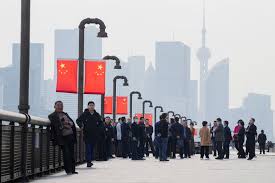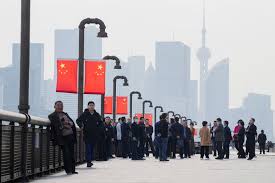
In February, China's annual consumer inflation fell to its lowest level in a year, as consumers maintained caution about spending even though strong pandemic restrictions were lifted in late 2022.
Analysts said that when combined with the persistence of producer deflation, which was also reported on Thursday, the data showed that price pressure was no longer an impediment to more government action to support economic recovery from the COVID-19 disruption.
According to the National Bureau of Statistics (NBS), the consumer price index (CPI) rose 1.0% year on year in February, the slowest rate since February 2022.
The result was significantly lower than the 1.9% median estimate in a Reuters poll and the 2.1% annual increase seen in January.
The government expects consumer prices to be about 3% higher this year than in 2022.
"For monetary policy, which is focused on consolidating the economic recovery and achieving stable upward momentum, there is no constraint from an inflation rate that is within the policy target," said Bruce Pang, chief economist for greater China at JLL, commenting on the data.
According to Zhiwei Zhang, president of Pinpoint Asset Management, the figures contradicted other data that showed significant strength in domestic demand.
"Nonetheless, the weak CPI inflation opens room for the government to launch more monetary easing policies," he said.
However, economists do not anticipate significant monetary policy changes this year. To stimulate the economy, the government reduced bank reserve requirements twice last year.
Whereas other countries are experiencing decades-high inflation rates, China's last-year efforts to control COVID-19 disrupted production and suppressed demand, keeping price pressures in check. Economists predict that inflation will rise in the coming months, owing primarily to the end of pandemic controls.
The yuan fell on Thursday as price data raised investor concerns about the pace of the recovery, which is being hampered by weakening foreign demand and a domestic property slump.
The parliament has set a conservative growth target for 2023 gross domestic product of around 5%, indicating that policymakers are aware of economic headwinds.
The NBS attributed the slowing growth in consumer prices to lower demand following the Lunar New Year holidays in January. According to the report, most fresh food prices had dropped as a result of the warm weather and plentiful supply.
The seasonally adjusted CPI fell 0.5% from the previous month, falling short of the 0.2% gain predicted. In January, the monthly CPI increased by 0.8%.
In February, core annual consumer inflation, which excludes volatile food and energy prices, was 0.6%, down from 1.0% in January.
Producer deflation widened and lasted a fifth month.
The producer price index (PPI) fell 1.4% year on year in February, owing primarily to lower commodity prices. This compares to a Reuters poll's median forecast of a 1.3% drop and an annual contraction of 0.8% in January.
Producer prices have been consistently lower than a year ago since October.
Last year, the economy delivered one of its worst performances in decades, hampered by three years of pandemic controls, a property downturn, and a crackdown on private enterprise.
The government intends to stick to its usual strategy of infrastructure spending to boost growth.
(Source:www.businesstoday.in)
Analysts said that when combined with the persistence of producer deflation, which was also reported on Thursday, the data showed that price pressure was no longer an impediment to more government action to support economic recovery from the COVID-19 disruption.
According to the National Bureau of Statistics (NBS), the consumer price index (CPI) rose 1.0% year on year in February, the slowest rate since February 2022.
The result was significantly lower than the 1.9% median estimate in a Reuters poll and the 2.1% annual increase seen in January.
The government expects consumer prices to be about 3% higher this year than in 2022.
"For monetary policy, which is focused on consolidating the economic recovery and achieving stable upward momentum, there is no constraint from an inflation rate that is within the policy target," said Bruce Pang, chief economist for greater China at JLL, commenting on the data.
According to Zhiwei Zhang, president of Pinpoint Asset Management, the figures contradicted other data that showed significant strength in domestic demand.
"Nonetheless, the weak CPI inflation opens room for the government to launch more monetary easing policies," he said.
However, economists do not anticipate significant monetary policy changes this year. To stimulate the economy, the government reduced bank reserve requirements twice last year.
Whereas other countries are experiencing decades-high inflation rates, China's last-year efforts to control COVID-19 disrupted production and suppressed demand, keeping price pressures in check. Economists predict that inflation will rise in the coming months, owing primarily to the end of pandemic controls.
The yuan fell on Thursday as price data raised investor concerns about the pace of the recovery, which is being hampered by weakening foreign demand and a domestic property slump.
The parliament has set a conservative growth target for 2023 gross domestic product of around 5%, indicating that policymakers are aware of economic headwinds.
The NBS attributed the slowing growth in consumer prices to lower demand following the Lunar New Year holidays in January. According to the report, most fresh food prices had dropped as a result of the warm weather and plentiful supply.
The seasonally adjusted CPI fell 0.5% from the previous month, falling short of the 0.2% gain predicted. In January, the monthly CPI increased by 0.8%.
In February, core annual consumer inflation, which excludes volatile food and energy prices, was 0.6%, down from 1.0% in January.
Producer deflation widened and lasted a fifth month.
The producer price index (PPI) fell 1.4% year on year in February, owing primarily to lower commodity prices. This compares to a Reuters poll's median forecast of a 1.3% drop and an annual contraction of 0.8% in January.
Producer prices have been consistently lower than a year ago since October.
Last year, the economy delivered one of its worst performances in decades, hampered by three years of pandemic controls, a property downturn, and a crackdown on private enterprise.
The government intends to stick to its usual strategy of infrastructure spending to boost growth.
(Source:www.businesstoday.in)














